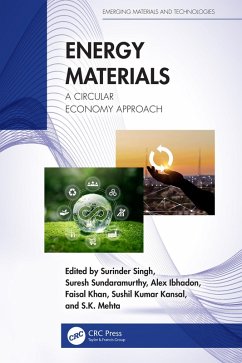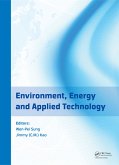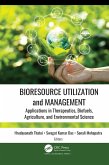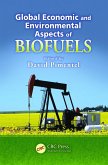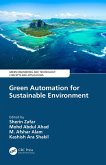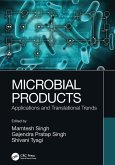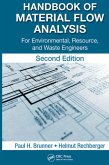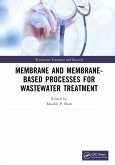Energy Materials (eBook, ePUB)
A Circular Economy Approach
Redaktion: Singh, Surinder; Mehta, S. K.; Kumar Kansal, Sushil; Khan, Faisal; Ibhadon, Alex; Sundaramurthy, Suresh
178,95 €
178,95 €
inkl. MwSt.
Sofort per Download lieferbar

89 °P sammeln
178,95 €
Als Download kaufen

178,95 €
inkl. MwSt.
Sofort per Download lieferbar

89 °P sammeln
Jetzt verschenken
Alle Infos zum eBook verschenken
178,95 €
inkl. MwSt.
Sofort per Download lieferbar
Alle Infos zum eBook verschenken

89 °P sammeln
Energy Materials (eBook, ePUB)
A Circular Economy Approach
Redaktion: Singh, Surinder; Mehta, S. K.; Kumar Kansal, Sushil; Khan, Faisal; Ibhadon, Alex; Sundaramurthy, Suresh
- Format: ePub
- Merkliste
- Auf die Merkliste
- Bewerten Bewerten
- Teilen
- Produkt teilen
- Produkterinnerung
- Produkterinnerung

Bitte loggen Sie sich zunächst in Ihr Kundenkonto ein oder registrieren Sie sich bei
bücher.de, um das eBook-Abo tolino select nutzen zu können.
Hier können Sie sich einloggen
Hier können Sie sich einloggen
Sie sind bereits eingeloggt. Klicken Sie auf 2. tolino select Abo, um fortzufahren.

Bitte loggen Sie sich zunächst in Ihr Kundenkonto ein oder registrieren Sie sich bei bücher.de, um das eBook-Abo tolino select nutzen zu können.
This book emphasizes the engineering scalability of a circular economy approach to development and use of energy materials. It focuses on waste minimization and its valorization, recycling and reuse, and emerging sustainable materials and technologies required for production of these materials in the process industry and manufacturing sectors.
- Geräte: eReader
- mit Kopierschutz
- eBook Hilfe
Andere Kunden interessierten sich auch für
![Environment, Energy and Applied Technology (eBook, ePUB) Environment, Energy and Applied Technology (eBook, ePUB)]() Environment, Energy and Applied Technology (eBook, ePUB)392,95 €
Environment, Energy and Applied Technology (eBook, ePUB)392,95 €![Bioresource Utilization and Management (eBook, ePUB) Bioresource Utilization and Management (eBook, ePUB)]() Bioresource Utilization and Management (eBook, ePUB)154,95 €
Bioresource Utilization and Management (eBook, ePUB)154,95 €![Global Economic and Environmental Aspects of Biofuels (eBook, ePUB) Global Economic and Environmental Aspects of Biofuels (eBook, ePUB)]() Global Economic and Environmental Aspects of Biofuels (eBook, ePUB)64,95 €
Global Economic and Environmental Aspects of Biofuels (eBook, ePUB)64,95 €![Green Automation for Sustainable Environment (eBook, ePUB) Green Automation for Sustainable Environment (eBook, ePUB)]() Green Automation for Sustainable Environment (eBook, ePUB)48,95 €
Green Automation for Sustainable Environment (eBook, ePUB)48,95 €![Microbial Products (eBook, ePUB) Microbial Products (eBook, ePUB)]() Microbial Products (eBook, ePUB)121,95 €
Microbial Products (eBook, ePUB)121,95 €![Handbook of Material Flow Analysis (eBook, ePUB) Handbook of Material Flow Analysis (eBook, ePUB)]() Paul H. BrunnerHandbook of Material Flow Analysis (eBook, ePUB)48,95 €
Paul H. BrunnerHandbook of Material Flow Analysis (eBook, ePUB)48,95 €![Membrane and Membrane-Based Processes for Wastewater Treatment (eBook, ePUB) Membrane and Membrane-Based Processes for Wastewater Treatment (eBook, ePUB)]() Membrane and Membrane-Based Processes for Wastewater Treatment (eBook, ePUB)52,95 €
Membrane and Membrane-Based Processes for Wastewater Treatment (eBook, ePUB)52,95 €-
-
-
This book emphasizes the engineering scalability of a circular economy approach to development and use of energy materials. It focuses on waste minimization and its valorization, recycling and reuse, and emerging sustainable materials and technologies required for production of these materials in the process industry and manufacturing sectors.
Dieser Download kann aus rechtlichen Gründen nur mit Rechnungsadresse in A, B, BG, CY, CZ, D, DK, EW, E, FIN, F, GR, HR, H, IRL, I, LT, L, LR, M, NL, PL, P, R, S, SLO, SK ausgeliefert werden.
Produktdetails
- Produktdetails
- Verlag: Taylor & Francis eBooks
- Seitenzahl: 424
- Erscheinungstermin: 29. März 2024
- Englisch
- ISBN-13: 9781040000069
- Artikelnr.: 69981428
- Verlag: Taylor & Francis eBooks
- Seitenzahl: 424
- Erscheinungstermin: 29. März 2024
- Englisch
- ISBN-13: 9781040000069
- Artikelnr.: 69981428
- Herstellerkennzeichnung Die Herstellerinformationen sind derzeit nicht verfügbar.
Dr. Surinder Singh is Faculty Member at Dr. S. S. Bhatnagar University Institute of Chemical Engineering and Technology, Panjab University, Chandigarh. He earned his Ph.D. from GGSIPU University Delhi and Masters in Chemical Engineering from Panjab University, Chandigarh. Dr. Suresh Sundaramurthy is Faculty & Former Head of Department, Chemical Engineering, Maulana Azad National Institute of Technology (MANIT) Bhopal, India. He received the Ph.D. in Chemical Engineering from Indian Institute of Technology Roorkee, India. Dr. Alex Ibhadon is Professor of Decarbonization, Sustainability and Reactor Engineering at the University of Hull. Dr. Ibhadon is a Fellow of the Royal Society of Chemistry (CChem), Senior Fellow UK Higher Education Academy, and Member Institute of Materials. Dr Ibhadon was the Director, School of Environmental Sciences (2015-2016) and Programme Director, Chemical Engineering (2017-2022) University of Hull. Dr. Ibhadon graduated with a PhD in Physical Polymer Chemistry from the University of Birmingham, United Kingdom. He has received > £7.08M in research funding (twenty-two grant awards) from the UK Royal Society, UK Engineering and Physical Sciences Research Council (EPSRC), Newton, EU, NetZero Innovation, and the Commonwealth. Dr. Faisal Khan is Mike O'Connor II Chair and Interim Department Head & Professor, Department of Chemical Engineering at Texas A&M University, USA. He is also the Director of Mary Kay O'Connor Process Safety Center and the Director of Ocean Energy Safety Institute. Dr. Khan is a former Professor and Canada Research Chair (Tier I) of Offshore Safety and Risk Engineering at Memorial University of Newfoundland, Canada. He is Editor-in-Chief of the Journal of Process Safety & Environmental Protection and Safety in Harsh Environments. Prof. Sushil Kumar Kansal, Fellow Royal Society of Chemistry (FRSC), is Professor at Dr. S. S. Bhatnagar University Institute of Chemical Engineering and Technology, Panjab University, Chandigarh. He is also Dean International students at PU, Chandigarh. Prof. S. K. Mehta, Fellow Royal Society of Chemistry (FRSC), is the Vice Chancellor of University of Ladakh, UT and Professor at the Department of Chemistry. He was the Ex-Chairman, Chemistry and Ex-Director SAIF/CIL/UCIM at Panjab University, Chandigarh. He has been a visiting scientist in the UK, Germany, Japan, USA, and France and has guided 15 postdoctoral, 48 Ph.D., and 50 Master students and handled 20 research projects.
1. Circular economy for energy materials-state of the art initiatives and
regulatory issues. 2. Circular Economy: An Industrial Perspective for
Sustainable Future. 3. Lithium as new gold for advanced energy material,
availability in nature, recovery from waste, and sustainability. 4.
Photo-Catalytic Materials for Production of Hydrogen from Water Using Solar
Energy. 5. Valorisation of lignocellulosic biomass into high value
chemicals: Forging a route towards the circular economy. 6. Sustainable
electrode materials/composites for Batteries and Fuel cells for achieving
supercapacitance and environmentally benign mobility. 7. Carbon-based
heterostructures: A circular economy energy application towards
electrochemical sensors. 8. Technologies for conversion of Biomass to
valuable chemicals and Fuels. 9. Microgrid structure for tapping renewable
energy. 10. Plastic Waste to Value Added Products via Recycling and
Upcycling. 11. Closing the Loop: Circular Economy for Food-Based Emulsions
and Films for Energy Materials. 12. MOF-Based Nanocomposites for Energy
Storage and Supercapacitor Applications. 13. A Circular Economy Approach to
Solar Energy. 14. Recycling Within the Chemical Industry: The Circular
Economy Approach- Industrial Perspectives. 15. The Future Perspectives of
Global Circular Economy Transition and Comprehensive Cost analysis.
regulatory issues. 2. Circular Economy: An Industrial Perspective for
Sustainable Future. 3. Lithium as new gold for advanced energy material,
availability in nature, recovery from waste, and sustainability. 4.
Photo-Catalytic Materials for Production of Hydrogen from Water Using Solar
Energy. 5. Valorisation of lignocellulosic biomass into high value
chemicals: Forging a route towards the circular economy. 6. Sustainable
electrode materials/composites for Batteries and Fuel cells for achieving
supercapacitance and environmentally benign mobility. 7. Carbon-based
heterostructures: A circular economy energy application towards
electrochemical sensors. 8. Technologies for conversion of Biomass to
valuable chemicals and Fuels. 9. Microgrid structure for tapping renewable
energy. 10. Plastic Waste to Value Added Products via Recycling and
Upcycling. 11. Closing the Loop: Circular Economy for Food-Based Emulsions
and Films for Energy Materials. 12. MOF-Based Nanocomposites for Energy
Storage and Supercapacitor Applications. 13. A Circular Economy Approach to
Solar Energy. 14. Recycling Within the Chemical Industry: The Circular
Economy Approach- Industrial Perspectives. 15. The Future Perspectives of
Global Circular Economy Transition and Comprehensive Cost analysis.
1. Circular economy for energy materials-state of the art initiatives and
regulatory issues. 2. Circular Economy: An Industrial Perspective for
Sustainable Future. 3. Lithium as new gold for advanced energy material,
availability in nature, recovery from waste, and sustainability. 4.
Photo-Catalytic Materials for Production of Hydrogen from Water Using Solar
Energy. 5. Valorisation of lignocellulosic biomass into high value
chemicals: Forging a route towards the circular economy. 6. Sustainable
electrode materials/composites for Batteries and Fuel cells for achieving
supercapacitance and environmentally benign mobility. 7. Carbon-based
heterostructures: A circular economy energy application towards
electrochemical sensors. 8. Technologies for conversion of Biomass to
valuable chemicals and Fuels. 9. Microgrid structure for tapping renewable
energy. 10. Plastic Waste to Value Added Products via Recycling and
Upcycling. 11. Closing the Loop: Circular Economy for Food-Based Emulsions
and Films for Energy Materials. 12. MOF-Based Nanocomposites for Energy
Storage and Supercapacitor Applications. 13. A Circular Economy Approach to
Solar Energy. 14. Recycling Within the Chemical Industry: The Circular
Economy Approach- Industrial Perspectives. 15. The Future Perspectives of
Global Circular Economy Transition and Comprehensive Cost analysis.
regulatory issues. 2. Circular Economy: An Industrial Perspective for
Sustainable Future. 3. Lithium as new gold for advanced energy material,
availability in nature, recovery from waste, and sustainability. 4.
Photo-Catalytic Materials for Production of Hydrogen from Water Using Solar
Energy. 5. Valorisation of lignocellulosic biomass into high value
chemicals: Forging a route towards the circular economy. 6. Sustainable
electrode materials/composites for Batteries and Fuel cells for achieving
supercapacitance and environmentally benign mobility. 7. Carbon-based
heterostructures: A circular economy energy application towards
electrochemical sensors. 8. Technologies for conversion of Biomass to
valuable chemicals and Fuels. 9. Microgrid structure for tapping renewable
energy. 10. Plastic Waste to Value Added Products via Recycling and
Upcycling. 11. Closing the Loop: Circular Economy for Food-Based Emulsions
and Films for Energy Materials. 12. MOF-Based Nanocomposites for Energy
Storage and Supercapacitor Applications. 13. A Circular Economy Approach to
Solar Energy. 14. Recycling Within the Chemical Industry: The Circular
Economy Approach- Industrial Perspectives. 15. The Future Perspectives of
Global Circular Economy Transition and Comprehensive Cost analysis.
